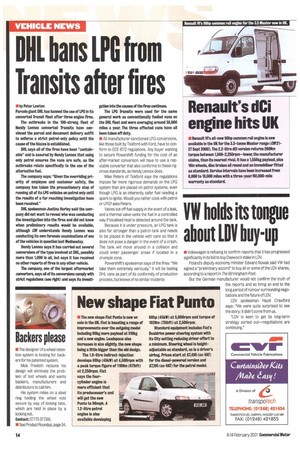DHL bans LPG from Transits after fires
Page 16

If you've noticed an error in this article please click here to report it so we can fix it.
a by Peter Lawton
Parcels giant DHL has banned the use of LPG in its converted Transit fleet after three engine fires.
The outbreaks in the 100-strong fleet of Handy Lennox converted Transits have convinced the parcel and document delivery outfit to enforce a strict petrol-only policy until the cause of the blazes is established.
DHL says all of the fires have been 'containable" and is assured by Hendy Lennox that using only petrol ensures the vans are safe, as the outbreaks relate specifically to the use of the alternative fuel.
The company says: "Given the overriding priority of employee and customer safety, the company has taken the precautionary step of running all of its LPG vehicles on petrol only until the results of a far reaching Investigation have been received."
DK spokesman Justine Hurley said the company did not want to reveal who was conducting the investigation into the fires and did not know when preliminary results would be available, although CM understands liendy Lennox was conducting its own forensic examinations of one of the vehicles In question last Wednesday.
Hendy Lennox says it has carried out several conversions of the type involved at DHL, possibly more than 1,000 in all, but says it has received no other reports of fires in any other vehicle.
The company, one of the largest aftermarket converters, says all of its conversions comply with strict regulations (see right) and says its Investi
gator' into the causes of the fires continues.
The LPG Transits wore used for the same general work as conventionally fuelled vans on the DHL fleet and were averaging around 38,000 miles a year. The three affected vans have all been taken off duty.
• All manufacturer-sanctioned LPG conversions, like those built by Tickford with Ford, have to conform to [CE 67/2 regulations. Any buyer wanting to secure Powershift funding for the cast of an after-market conversion will have to use a reputable converter that also conforms to these rigorous standards, as Hendy Lennox does.
Mike Peters of Tickford says the regulations impose far more rigorous demands on the LPG system than are placed on petrol systems, even though LPG is an inherently safer fuel needing a spark to ignite, Would you rather cook with petrol or LPGP asks Peters.
Valves cut off fuel supply in the event of a leak, and a thermal valve vents the fuel in a controlled way if localised heat is detected around the tank.
Because it is under pressure, an LPG tank is also far stronger than a petrol tank and needs to be placed in the vehicle with care so that it does not pose a danger in the event of a crash. The tank will move around in a collision and could enter passenger areas if located in a crumple zone, Powershift's spokesman says of the fires: "We take them extremely seriously." it will be testing DHL vans as part of its conformity of production process, but knows of no similar incidents
































































































